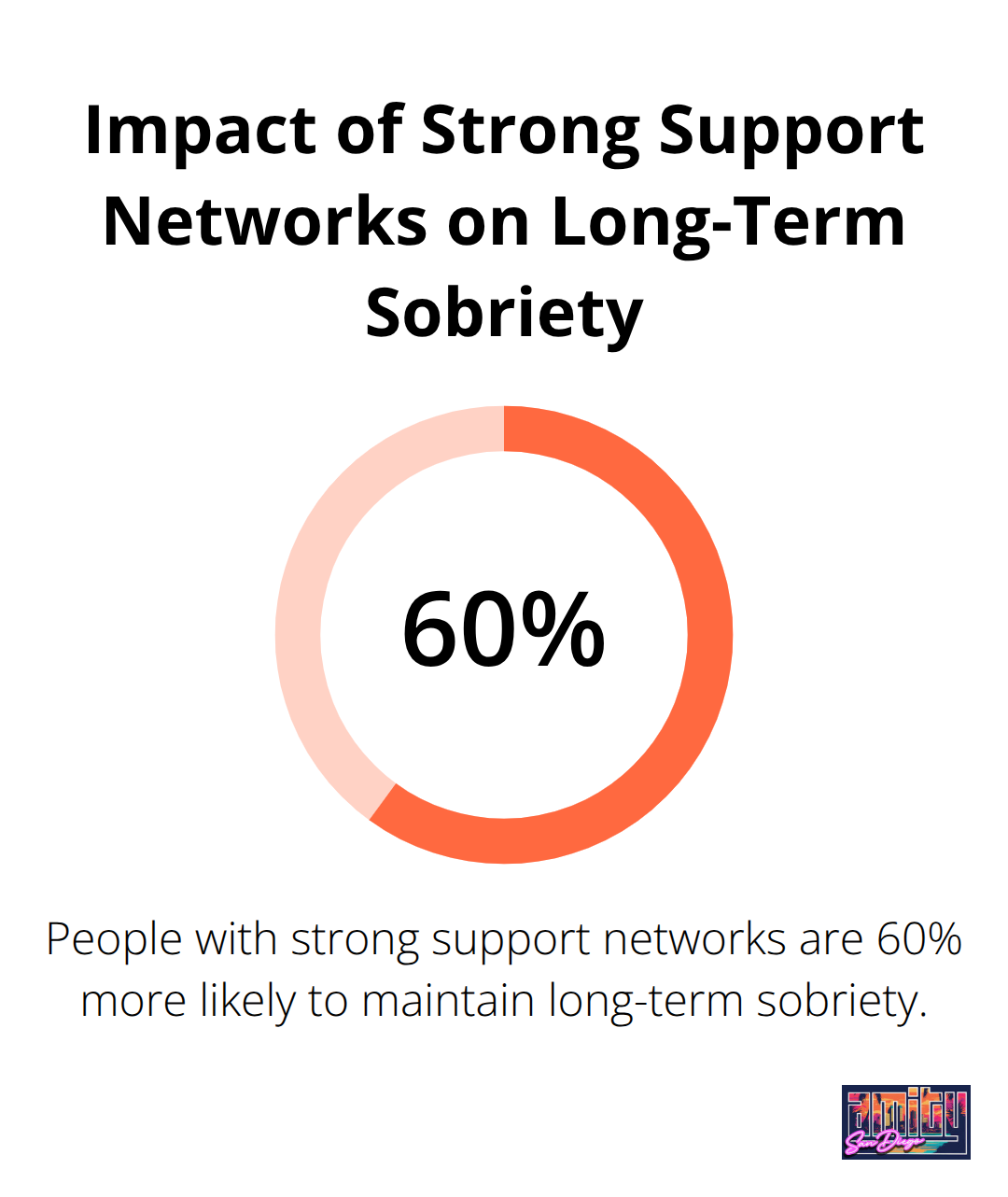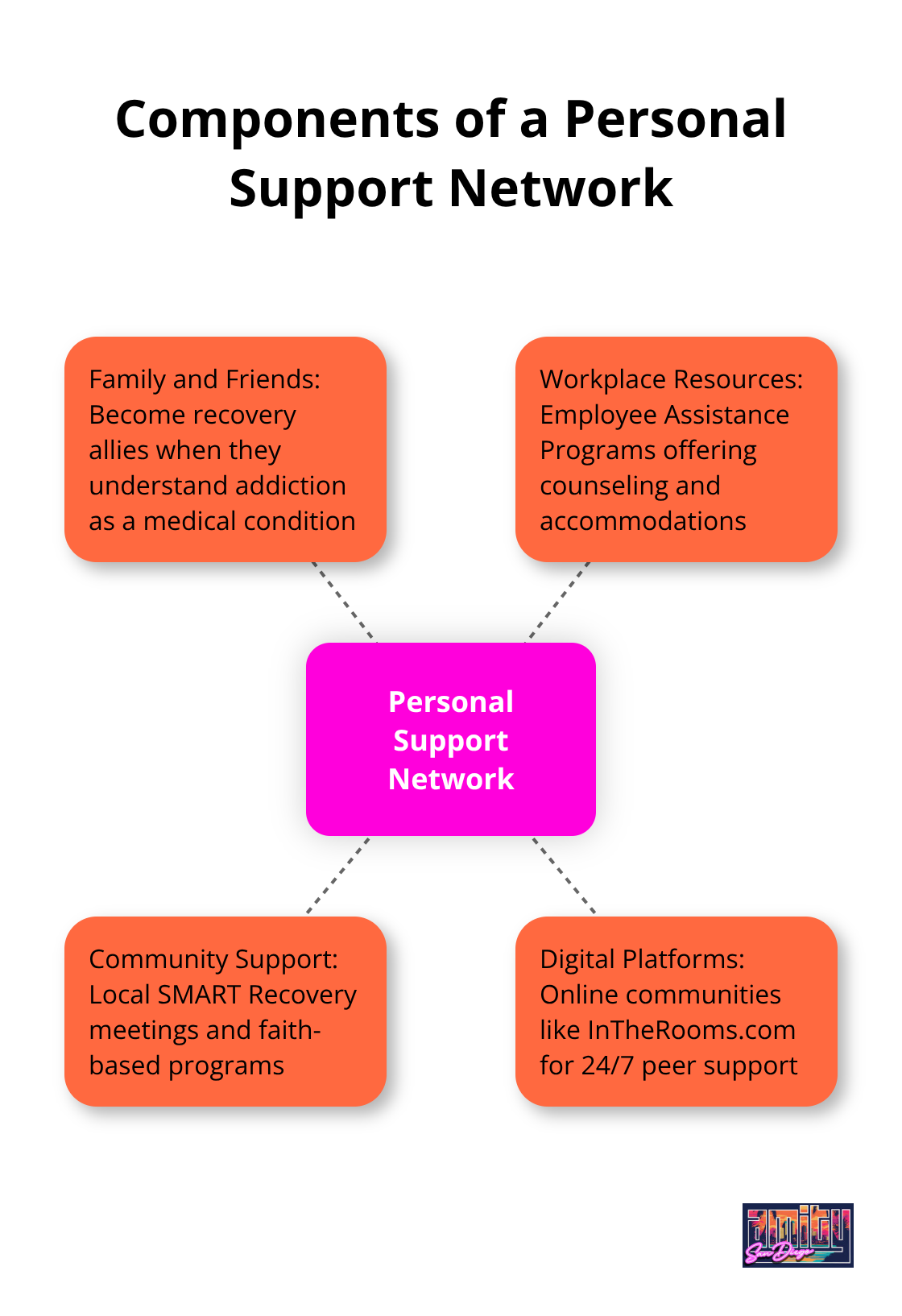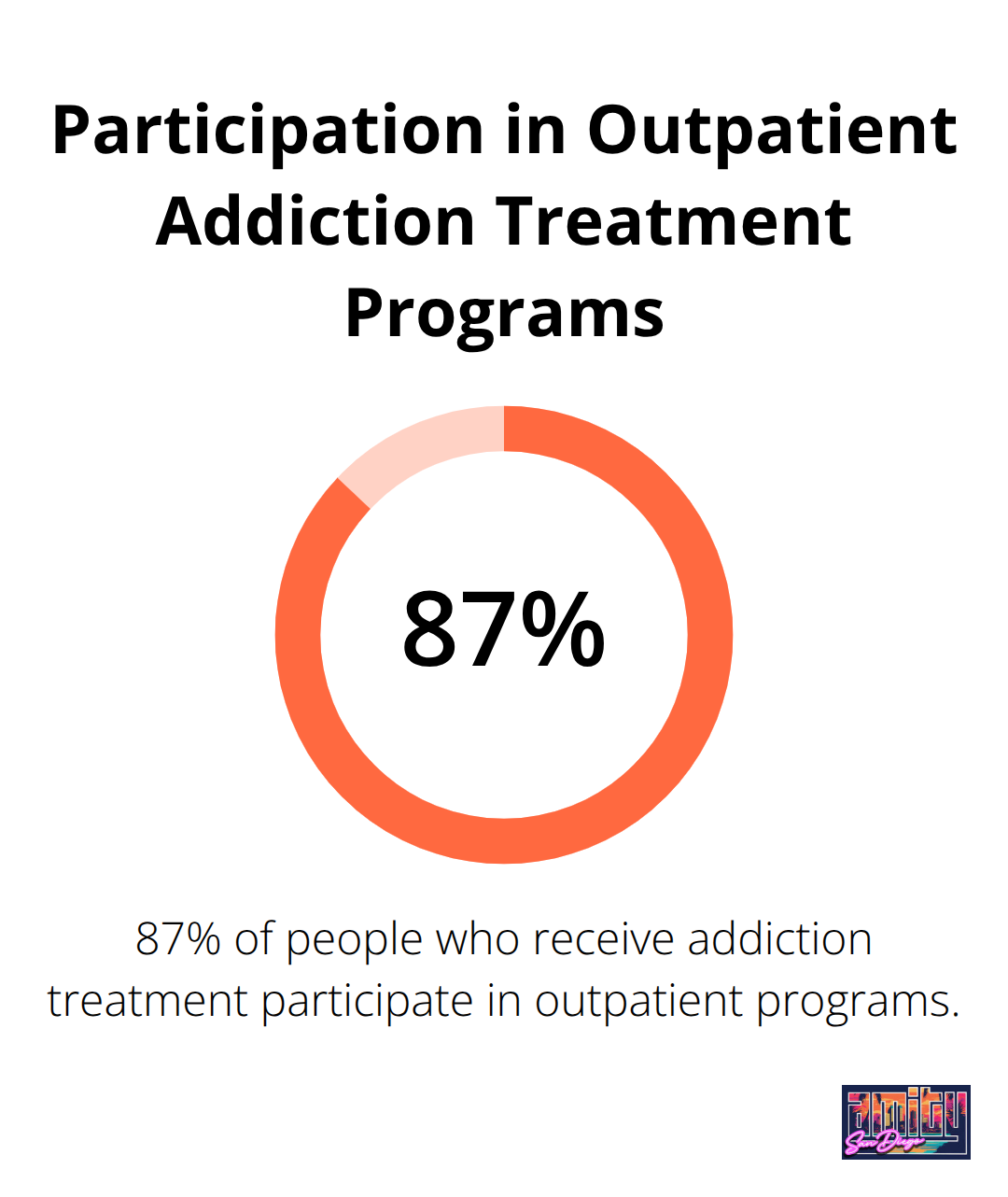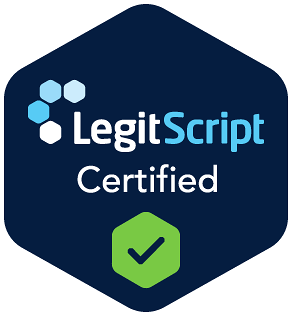Recovery from addiction requires more than willpower alone. The importance of support in addiction recovery cannot be overstated, as studies show people with strong support networks are 60% more likely to maintain long-term sobriety.
We at Amity San Diego understand that building the right support system involves multiple layers of professional care, personal relationships, and community resources. This guide will help you identify and access the support you need for lasting recovery.

What Professional Support Can Help Your Recovery?
Professional support forms the backbone of successful addiction recovery. Licensed therapists and addiction counselors lead evidence-based treatment approaches that address the psychological roots of addiction. These specialists apply cognitive-behavioral therapy, dialectical behavior therapy, and trauma-informed care to help clients overcome substance use disorders.
The National Institute on Drug Abuse reports that behavioral therapy combined with medication increases treatment effectiveness by 40-60%. Clients should seek counselors certified by the National Certification Commission for Addiction Professionals or licensed clinical social workers with addiction specialties.
Medical Team Integration
Board-certified addiction medicine physicians and psychiatrists provide medication-assisted treatment with FDA-approved medications like buprenorphine, methadone, and naltrexone. Research shows that methadone, buprenorphine, and naltrexone can reduce opioid use and other negative health outcomes.
These medical professionals monitor physical health, adjust medications, and coordinate with therapy teams. Medical providers also address co-occurring mental health conditions, which affect approximately 21.5 million adults in the United States according to SAMHSA’s 2022 National Survey on Drug Use and Health. Comprehensive programs integrate medical and psychological care for optimal outcomes.
Peer Support Specialists
Peer support specialists and recovery coaches offer unique value through lived experience. Studies show peer support increases treatment retention and improves relationships with treatment providers and social supports. These professionals understand the challenges of recovery firsthand and provide hope through personal experience.
Recovery coaches provide practical guidance for daily challenges, help navigate treatment systems, and offer accountability between therapy sessions. The Connecticut Community for Addiction Recovery found that clients who work with peer specialists stay in treatment 60% longer than those without peer support.
Professional Certification Standards
Choose coaches certified through organizations like the International Credentialing and Reciprocity Consortium. These professionals bridge the gap between clinical treatment and real-world recovery while maintaining professional boundaries. They complement clinical care rather than replace it.
Quality peer specialists complete formal training programs and adhere to ethical standards. They focus on recovery goals, skill development, and community connection. This professional support creates a foundation that connects seamlessly with personal relationships and community resources.
Who Should Be in Your Personal Support Network?
Professional treatment provides the clinical foundation, but personal relationships often determine long-term recovery success. Research from the Journal of Substance Abuse Treatment shows that people with just one supportive relationship reduce their relapse probability by nearly five times.

Family and Friends as Recovery Allies
Family members and close friends become recovery allies when they understand addiction as a medical condition rather than a moral failing. The National Institute on Drug Abuse emphasizes that family therapy can strengthen recovery outcomes by addressing relationship dynamics that may contribute to substance use.
Successful family involvement requires clear boundaries, attendance at educational sessions about addiction, and communication techniques that support rather than enable destructive behaviors. Family members must learn to separate the person from the addiction while maintaining accountability for recovery actions.
Workplace Recovery Resources
Many employers offer Employee Assistance Programs that provide confidential counseling, referrals to addiction treatment San Diego services, and workplace accommodations during treatment. The Americans with Disabilities Act protects employees who seek addiction treatment from discrimination when they disclose their condition appropriately.
These programs often include flexible work schedules for treatment appointments, temporary job modifications, and access to mental health resources. Supervisors trained in addiction awareness can provide additional workplace support without compromising professional boundaries.
Community Support Networks
Community resources include local SMART Recovery meetings, which use evidence-based techniques. These meetings focus on motivation, coping skills, and rational decision-making rather than traditional 12-step approaches.
Faith-based recovery programs, volunteer opportunities, and recreational clubs create additional connection points within the community. Local libraries often host support groups and provide quiet spaces for reflection and planning.
Digital Support Platforms
Online support communities like InTheRooms.com connect people globally through video meetings and forums (providing 24/7 access to peer support). Reddit’s recovery communities provide active spaces where members share daily experiences and practical advice.
These digital platforms work best when combined with in-person connections, creating multiple touchpoints for support throughout the recovery process. The next step involves finding quality treatment programs that can coordinate with your personal support network.
How Do You Choose the Right Treatment Program?
Outpatient Treatment Delivers Better Real-World Results
Outpatient programs consistently outperform residential treatment for most people with substance use disorders. The Substance Abuse and Mental Health Services Administration reports that 87% of people who receive addiction treatment participate in outpatient programs, and these programs show similar or better outcomes than inpatient care at significantly lower costs.

Intensive outpatient programs require 9 hours weekly and allow clients to maintain work, family, and educational responsibilities while they receive professional care. Partial hospitalization programs provide 20-30 hours of weekly treatment for people who need more intensive support without 24-hour supervision.
Clients learn recovery skills in their actual environments rather than artificial institutional settings. This approach helps people practice new coping strategies in real-world situations where they will need them most.
Treatment Center Quality Indicators Matter More Than Marketing
Joint Commission accreditation provides comprehensive evaluation standards for addiction treatment centers. Look for centers that employ board-certified addiction medicine physicians, licensed clinical social workers, and certified addiction counselors rather than facilities staffed primarily with peer counselors.
Treatment centers should provide transparent outcome data that includes completion rates, 30-day abstinence rates, and client satisfaction scores. Most legitimate programs maintain 70-85% completion rates and willingly share these statistics with prospective clients.
Insurance Coverage and Financial Planning
Insurance coverage varies significantly between providers. Private insurance payments represent a significant portion of treatment funding, though coverage levels differ by plan type. Verify benefits before you start treatment and ask about payment plans for uncovered portions (many centers offer flexible options).
Contact your insurance provider directly to confirm coverage details and pre-authorization requirements. Some plans require referrals from primary care physicians or prior authorization for specific treatment levels. For comprehensive addiction treatment San Diego options, research facilities that accept your specific insurance plan.
Final Thoughts
A comprehensive support system combines professional treatment, personal relationships, and community resources into a coordinated network that addresses every aspect of recovery. The importance of support in addiction recovery becomes evident when you see how each element reinforces the others to create lasting change. You must select quality professional care that matches your specific needs, build personal connections with people who understand addiction as a medical condition, and connect with community resources that provide accountability.
Recovery requires daily commitment paired with strategic long-term planning for sustained success. Contact treatment providers who offer transparent outcome data and evidence-based approaches that align with your recovery goals. Verify insurance benefits before you start treatment to avoid unexpected financial obstacles (most quality programs accept major insurance plans).
We at Amity San Diego provide personalized outpatient care that works with your existing support network to create comprehensive treatment plans. Take action today rather than wait for the perfect moment to begin your recovery journey. Call addiction treatment San Diego providers, attend support group meetings, and have honest conversations with family members about your recovery goals.



